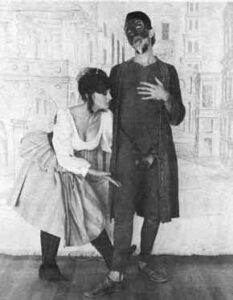“Let us hope that their theater may allow them to enjoy as entertainment that terrible and never-ending labour which should ensure their maintenance together with the terror of their increasing transformation. Let them here produce their own lives in the simplest way; for the simplest way of living in an art.”
—B. Brecht

The productions of the San Francisco Mime Troupe are ‘hardly of that dream-like stuff with its many narcotic side effects that today’s “theater-going audience” is used to. Instead of allowing the spectators a means of escape, the troupe keeps them on the same level as they crawl in on and then tried to get them to stand up.
Their latest tactic in this strategy, “L’Amant Militaire,” performed Oct. 28 at the Detroit Institute of Arts in a benefit for this newspaper, showed up the phoniness of so much other theater by aiming the thoughts and emotions of the audience at real targets. While the play was based on Goldoni’s original of the 18th century the relevance of its adaption left no doubt that its issues were today’s, and the loose Commedia style allowed these issues to be forcefully demonstrated by the actors to what they obviously hoped was a live audience.
The result was guerilla theater in which the sheer animal vitality of the acting exploded and occasionally got carried well beyond the limits of the simple plot and staging. At times the actors fell in love with the silliness of their words, the absurdity of their gestures and went on to create operatic flourishes and frenzied improvisations.
They got humanly in each other’s way. On one occasion the passionate Spanish guitarist got too passionate and had to be dragged off by his fellow actors. All to the good; a revolutionary theater has to rely on strictly human capabilities and one of the things which made “L’Amante Militaire” was the guts of the acting.
But the Mime Troupe exists also to instruct and incite its audience. Perhaps in this respect it was not always suited to the audience which met them in Detroit but rather more appropriate to the one it tries to seduce in the open air. For this other audience it reveals the cosy relationship of the businessman and the general, and disperses the romantic illusions surrounding military life with the song: “Join the army! See the world! Burn a gook! Screw a girl!”
It is to them that Pantalone gleefully confides the secret of his success (“Screw the poor.”) And it was for their benefit that Punch, the one-man puppet theater strolled out to rasp the words of some of the big mouths of American social philosophy: P.T. Barnum, Gen. Hershey, Al Capone, and Marshmallow Eisenhower.
Although radicals have a right to their own entertainment, another audience might have found these revelations more than just gratifying. At this stage of the game, most of us are only too well aware of the sinister structure of the war; more amused than astonished by it, yet content to be against it rather than to oppose it.
In terms of any possible change in the attitudes and feelings of the spectators, last year’s “Civil Rights in a Cracker Barrel” production probably turned more people around than “L’Amant Militaire,” for it is personally more difficult to evade the racism that poisons this society than it is to be against the war.
Any further step in one’s thinking about the war would involve coming to terms with the means necessary to fight it. In this respect enough people choked when the perky cheerleader glided out on the stage to lead yells of “Hell, No. We Won’t Go” to raise doubts about their having grown to accept any new obligations.
Perhaps it was in recognition of this unreadiness to come anywhere close to “lobbing a couple mortars at the induction center” which prompted R.G. Davis’ curtain-call speech over the footlights:
“This is our society. If we don’t like it, we must change it. If we can’t change it, we must destroy it.”
